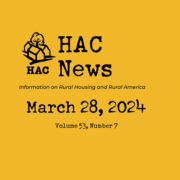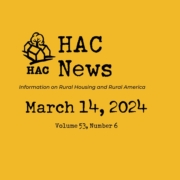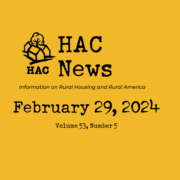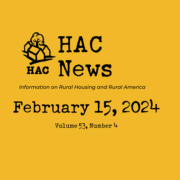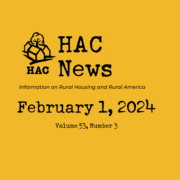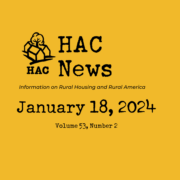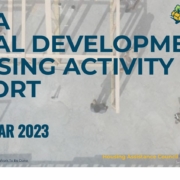HAC News: March 28, 2024
TOP STORIES
April is National Fair Housing Month
This year is the 56th anniversary of the passage of the Fair Housing Act. HUD will celebrate the theme Fair Housing: The ‘Act’ in Action. For more information about fair housing rights or to file a complaint, visit HUD’s Fair Housing and Equal Opportunity website or call 1-800-669-9777. For information or complaints related to USDA rural housing, visit USDA RD’s Civil Rights site.
Flexibility increased for rural multifamily owners to use surplus cash
A new regulation will allow owners of properties with financing from USDA’s Section 515 and 514/516 rental programs to apply cash to approved soft debt. The agency says this change provides a new source of capital for property improvements. For more information, contact Michael Resnik, USDA, 202-430-3114.
USDA formalizes 30-day written eviction notices
Owners of Section 515 and 514/516 rental properties must give tenants written notification at least 30 days before terminating a lease or taking eviction actions. The notice must include instructions on how a tenant can cure the nonpayment to avoid eviction and how to recertify household income. These notices will be required after April 24, 2024, and they must be included in leases by September 25, 2025. For more information, contact Michael Resnik, USDA, 202-720-1615.
Native American loan guarantee program gets revised rules
HUD is updating its regulations for the Section 184 program, which have not been substantially revised since 1996. The department says the changes will minimize potential risk and increase participation by financial institutions. The new rules are effective June 18. For more information, contact Krisa Johnson, HUD, 202-402-4978.
RuralSTAT
There are more than 2,500 banks headquartered in rural areas, and rural banks comprise more than half of all FDIC insured institutions in the United States. Between 1995 and 2022 the number of rural headquartered banks declined by 57%. Source: HAC tabulations of FDIC data.
OPPORTUNITIES
Farmworker housing repair funds available
USDA’s subsequent Section 514 and 516 off-farm labor housing loans and grants may be used to improve, repair, or make modifications to existing off-farm labor housing properties. The deadline is June 18. USDA will hold a webinar for potential applicants on April 3. For more information, contact Jonathan Bell, USDA, 254-727-5647.
Pay for Success Program can support permanent supportive housing
The Justice Department’s FY24 Second Chance Act Pay for Success Program offers funds to states, cities, townships, counties, special districts, federally recognized Tribal governments, and community-based public and Native American housing authorities to address transition and re-entry services including permanent supportive housing for people with mental health, substance use, or co-occurring disorders who are or were involved in the criminal justice system. Applications are due April 25. For more information, contact DOJ at 800-851-3420 or grants@ncjrs.gov.
REGULATIONS AND FEDERAL AGENCIES
Dates delayed for part of new CRA rule
The deadline for banks to make changes to their assessment areas and their public files, as required by the 2023 Community Reinvestment Act final rule, is now January 1, 2026 rather than April 1, 2024. The federal bank regulators have also made technical amendments to the CRA rule and related agency regulations that reference it. Comments on the extended effective date are due May 13.
HUD posts resources on source of income discrimination
A new HUD webpage explains what source of income discrimination is and provides an interactive map to help families, PHAs, and landlords to identify jurisdictions that are covered by source of income protections for tenants with vouchers. There are also tips and resources for tenants and PHAs on what to do if such discrimination occurs, as well as strategies for how to reduce it. To support efforts to improve landlord participation, HUD has posted an HCV Landlord Strategies Guidebook on its landlord resources page.
USDA suggests changes for multifamily housing credit reports
To avoid the complexities of its current process, USDA proposes to change the way it obtains credit reports for determining eligibility and feasibility for its Section 515 and 514/516 direct rental housing programs. Rather than collecting fees and ordering credit reports itself, the agency would require applicants to provide credit reports. Comments are due May 28. For more information, contact Abby Boggs, USDA, 615-490-1371.
Rural home repair program instructions revised
Changes to the Section 504 homeowner repair loan and grant programs have been incorporated into USDA’s handbook.
USDA seeks input on Section 502 guarantee policy changes, offers new tool
A new online Policy Desk is intended to make it easier for lenders and stakeholders to provide feedback on proposed policy changes for the Section 502 loan guarantee program. Current proposals would revise servicing guidelines and simplify the mortgage recovery advance process.
Priorities changing for USDA multifamily guarantees
A regulatory change removes the priorities currently listed in the rules for the Section 538 multifamily loan guarantee program and inserts a general statement allowing the agency to set and change priorities for the program without going through the rulemaking process. For more information, contact Tammy Daniels, USDA, 202-720-0021.
Comments requested on participation in government decisionmaking
The Office of Management and Budget is developing a government-wide framework, common guidelines, and leading practices for public participation and community engagement in government decisionmaking. It requests input on the experiences of individuals and organizations, including those from underserved communities, with informing federal government decisionmaking and participating in engagement activities with government agencies; examples of leading practices in this space; and other recommendations for this effort. Comments are due May 17. For more information, email publicparticipation@omb.eop.gov with “PPCE RFI” in the subject line, or call Cherie Klein, OMB, at 202-881-6220.
PUBLICATIONS AND MEDIA
Research considers why Native American borrowers pay more for home loans
The Center for Indian Country Development at the Minneapolis Federal Reserve examined the reasons why, on average, Native American borrowers pay more for home loans than White borrowers. CICD found that for Native American borrowers, living either on or off reservations, the disparity can largely be explained by heavy reliance on personal property loans used to purchase manufactured homes, and not by underwriting or demographic characteristics such as credit scores or incomes. The reliance on such loans likely stems from the lack of low-cost mortgage options available to Native homebuyers, CICD suggested, as well as factors such as diminished access to generational wealth. Data indicated it is not due to the higher prevalence of manufactured homes on reservations, nor to the ownership structure of trust land.
Information posted to help decarbonize affordable housing
The Affordable Housing Decarbonization Hub, offering housing providers access to resources and information for equitable decarbonization, was recently launched by Enterprise Community Partners, the Housing Partnership Network, and the Rocky Mountain Institute. The hub also allows users to submit questions to experts and to share suggestions for additional resources.
Connections between housing and climate change studied
Residential buildings are responsible for 20% of total primary energy consumption in the U.S., reports the Terner Center for Housing Innovation at UC Berkeley. Its report, Housing + Climate Policy: Building Equitable Pathways to Sustainability and Affordability, looks at the existing research on climate and housing in the U.S. in two key areas: how housing decarbonization and production strategies can reduce pollution to mitigate climate change, and how climate change impacts renters, homeowners, and the broader housing industry. This is the first paper in a planned Housing + Climate research initiative, intended to provide policy makers and advocates with evidence to advance effective policy solutions to both the climate and housing crises.
HUD reports on human trafficking survivors’ housing needs
Housing Needs of Survivors of Human Trafficking Study, a new report from HUD, notes that programs and services exist but are not scaled to meet survivors’ needs. In rural areas and Native lands, it says, housing and service resources for survivors are particularly scarce. The study recommends increased resources, low-barrier entry processes, trauma-informed approaches, culturally specific service delivery, and more.
Homeowners’ insurance costs rising
Nationwide, insurance costs for single-family homeowners with conventional mortgages have increased along with home values, though the effective rate (cost per dollar of value) has risen more slowly, Freddie Mac reports in a new analysis. U.S. Economic, Housing and Mortgage Market Outlook – March 2024 includes data showing that rates vary widely between states, based on hazards and state regulations.
HAC
Design workshops underway
The Citizens’ Institute on Rural Design (CIRD), in partnership with the National Endowment for the Arts, HAC, and To Be Done Studio, kicked off its 2023-2024 CIRD Design Workshops with back-to-back events. The first CIRD workshop took place November 29-December 1 in Thompson Falls, MT where the U.S. Forest Service and local organizations are looking to revamp an outdoor recreation area. The workshop included hard conversations, problem solving, and development of strategies that best suited the community. Since the Thompson Falls workshop, CIRD has completed workshops in Boswell, IN, Sunnyside, WA, and most recently Grenada, MS. Look out for other CIRD workshop updates here and sign up for the CIRD newsletter here.
HAC is hiring
HAC job listings, each with application instructions, are available on our website.
- Senior Loan Officer
- Portfolio Management Associate
- Housing Specialist (Community Builder) (6 positions)
- Research Associate
- Research Assistant
Need capital for your affordable housing project?
HAC’s loan fund provides low interest rate loans to support single- and multifamily affordable housing projects for low-income rural residents throughout the U.S. and territories. Capital is available for all types of affordable and mixed-income housing projects, including preservation, new development, farmworker, senior and veteran housing. HAC loan funds can be used for pre-development, site acquisition, site development, construction/rehabilitation and permanent financing. Contact HAC’s loan fund staff at hacloanfund@ruralhome.org, 202-842-8600.
Please note: HAC is not able to offer loans to individuals or families. Borrowers must be nonprofit or for-profit organizations or government entities (including Tribes).
HAC’s office has moved
HAC’s new street address, effective on January 1, 2024, is 1828 L Street, N.W., Suite 505, Washington, DC 20036. Our phone number remains 202-842-8600.
Want to reprint a HAC News item?
Please credit the HAC News and provide a link to HAC’s website. Thank you!

